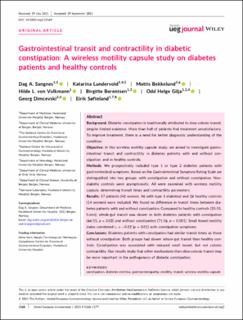Gastrointestinal transit and contractility in diabetic constipation: A wireless motility capsule study on diabetes patients and healthy controls
Sangnes, Dag A.; Lundervold, Katarina; Bekkelund, Mattis; Volkmann, Hilde Løland Von; Berentsen, Birgitte; Gilja, Odd Helge; Dimcevski, Georg; Søfteland, Eirik
Journal article, Peer reviewed
Published version

Åpne
Permanent lenke
https://hdl.handle.net/11250/2834380Utgivelsesdato
2021Metadata
Vis full innførselSamlinger
- Department of Clinical Medicine [2043]
- Registrations from Cristin [9482]
Originalversjon
United European Gastroenterology journal. 2021, 9 (10), 1168-1177. 10.1002/ueg2.12169Sammendrag
Background: Diabetic constipation is traditionally attributed to slow colonic transit, despite limited evidence. More than half of patients find treatment unsatisfactory. To improve treatment, there is a need for better diagnostic understanding of the condition.
Objective: In this wireless motility capsule study, we aimed to investigate gastrointestinal transit and contractility in diabetes patients with and without constipation, and in healthy controls.
Methods: We prospectively included type 1 or type 2 diabetes patients with gastrointestinal symptoms. Based on the Gastrointestinal Symptom Rating Scale we distinguished into two groups: with constipation and without constipation. Non-diabetic controls were asymptomatic. All were examined with wireless motility capsule, determining transit times and contractility parameters.
Results: 57 patients (42 women, 46 with type 1 diabetes) and 26 healthy controls (14 women) were included. We found no difference in transit times between diabetes patients with and without constipation. Compared to healthy controls (35:55, h:min), whole-gut transit was slower in both diabetes patients with constipation (66:15, p = 0.03) and without constipation (71:16, p < 0.001). Small bowel motility index correlated rs = −0.32 (p = 0.01) with constipation symptoms.
Conclusions: Diabetes patients with constipation had similar transit times as those without constipation. Both groups had slower whole-gut transit than healthy controls. Constipation was associated with reduced small bowel, but not colonic contractility. Our results imply that other mechanisms than slow colonic transit may be more important in the pathogenesis of diabetic constipation.
